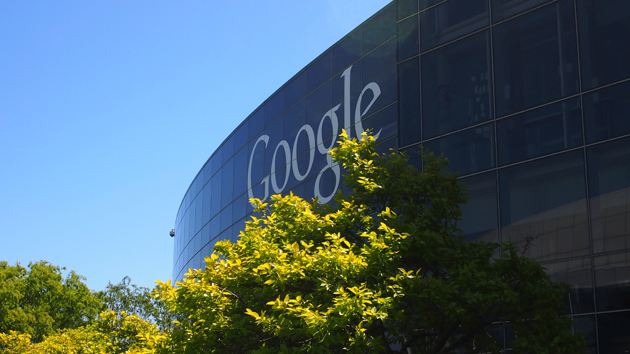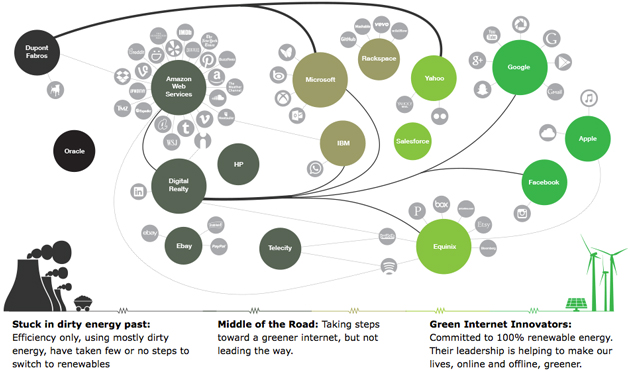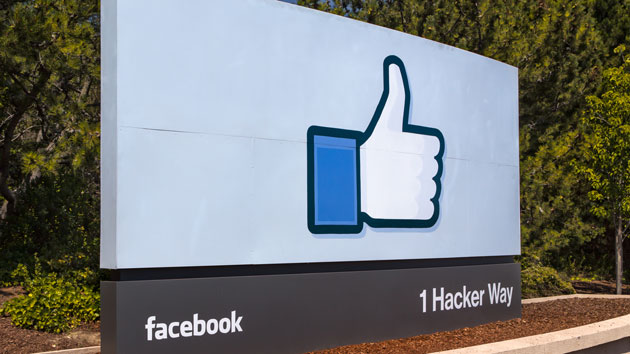
<a href="http://www.istockphoto.com/portfolio/leocopello#16568b97">Leo Copello</a>/iStock
This article originally appeared in Grist and is republished here as part of the Climate Desk collaboration.
“It’s not easy being green” is a tired cliché, but it’s still particularly true if you are a giant technology company. Even Apple, Facebook, and Google—the best of the bunch, according to a new report from Greenpeace—will have to put in serious additional effort to fully shift to clean energy, especially in terms of lobbying at the state and local level. And the industry laggards, which include Amazon and eBay, have that much further to go.
Here’s how Greenpeace categorizes the tech giants:

Energy efficiency in traditional appliances keeps improving, but our demand for energy is boosted by new technologies. In particular, companies that manufacture mobile devices and provide services like email, social networking, cloud storage, and streaming video have to contend with constantly escalating demand for data storage.
At the same time, being eco-friendly is important to many of those same companies—or at least important to their public image. Google, Facebook, Yahoo, and Microsoft all dropped out of the American Legislative Exchange Council (ALEC) last year because of bad publicity around the right-wing corporatist group’s opposition to action on climate change. But tech giants will need to do a lot more than quit dirty lobbying groups, Greenpeace argues; they’ll need to actually get involved in the political sphere on behalf of clean energy solutions.
First, the good news is that some tech companies are making respectable efforts to power their operations through clean energy sources. Google has invested heavily in solar energy, and Apple announced just yesterday that it’s expanding its renewable programs to manufacturing facilities in China. But in many cases, the issue is not whether companies have good intentions but whether clean energy is available to them.
Here are a few key quotes from the Greenpeace report:
- Apple continues to lead the charge in powering its corner of the internet with renewable energy even as it continues to rapidly expand. All three of its data center expansions announced in the past year will be powered with renewable energy.
- Google continues to match Apple in deploying renewable energy with its expansion in some markets, but its march toward 100 percent renewable energy is increasingly under threat by monopoly utilities for several data centers including those in North and South Carolina, Georgia, Singapore and Taiwan.
And here are some challenges the report lays out:
- Amazon’s adoption of a 100 percent renewable energy goal, while potentially significant, lacks basic transparency and, unlike similar commitments from Apple, Facebook or Google, does not yet appear to be guiding Amazon’s investment decisions toward renewable energy and away from coal.
- The rapid rise of streaming video is driving significant growth in our online footprint, and in power-hungry data centers and network infrastructure needed to deliver it.
- Microsoft has slipped further behind Apple and Google in the race to build a green internet, as its cloud footprint continues to undergo massive growth in an attempt to catch up with Amazon, but has not kept pace with Apple and Google in terms of its supply of renewable electricity.
The underlying problem in many cases is that dirty energy-dependent utility monopolies are providing the electricity for massive, and growing, data centers. If these utilities use coal or natural gas, then by extension so do the tech companies with data centers in their service areas. Meeting data-storage demand without burning more fossil fuels will not be easy. Greenpeace writes:
Big data’s massive growth is expected to continue with the emergence of cheap smartphones: nearly 80 percent of the planet’s adult population will be connected to the internet by 2020, and the total number of devices connected to the internet will be roughly twice the global population by 2018. Internet traffic from mobile devices increased 69 percent in 2014 alone with the rapid increase of video streaming to mobile devices, and mobile traffic will exceed what is delivered over wired connections by 2018.
There are different ways to increase renewable energy supply at data centers. The first, of course, is simply to generate clean power on site with solar panels or wind turbines. Apple is already doing this and other companies are following its lead. But data centers require so much energy that they won’t generally be able to cover most of their needs that way. Other free-market approaches include power purchase agreements, in which the tech companies can make a deal with a clean energy supplier, and “green tariffs,” in which they agree to buy 100 percent clean power from the local utility at a price premium.
To get all their energy from renewables, though, will require tech companies to engage in policy debates. Greenpeace writes:
In many markets, companies’ ability to power with renewable energy will remain severely limited without policy changes. Even in more liberalized markets, it behooves companies to advocate for policies that will green the broader grid, narrowing the ground that they need to cover to power with 100 percent renewable energy. Companies can and must become advocates with the regulators and policymakers who ultimately have the power to change markets in ways that will allow companies to achieve their renewable energy goals. State policymakers covet data center investments, offering significant tax incentives to companies to lure them into their borders. Companies could compel a similar race to the top on renewable energy.
There were a few instances last year of tech companies lobbying for clean energy policies—Google submitted comments in favor of the EPA’s Clean Power Plan, and several major tech firms signed the “Corporate Renewable Energy Buyers’ Principles” calling on state regulators and utilities to expand access to renewable energy.
Greenpeace argues that tech companies particularly need to get engaged in state and local politics, forming an effective counterweight to the fossil fuel and right-wing interest group money that has swayed state legislative races and outcomes in recent years. Last year, Facebook and Microsoft submitted comments to the Iowa Utilities Board in favor of distributed electricity generation, but that was a relatively isolated event. That sort of activism needs to become routine.
In North Carolina, for example, Greenpeace notes that it’s illegal to buy renewable energy from a third party instead of buying whatever dirty energy is offered by state monopoly Duke Energy. The same state legislature that is offering tax incentives to attract data centers is considering changing that law. Tech companies should tell North Carolina that doing so is a precondition to getting any data centers located there, Greenpeace argues. Similarly, Virginia has a harsh cap on third-party clean power purchases, and the State Corporation Commission is due to review that rule this year.
You can be sure that the utilities, the Koch brothers, Art Pope, and Americans for Prosperity will be involved in these fights. If clean energy supporters are not, they will be over before they have begun. To really be green, tech companies need to put their muscle into this fight.
















